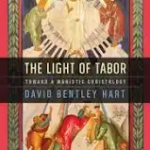Constantine (of all people) provides a neat little analysis of the violent ontology of polytheism is his Good Friday oration, which Eusebius appended to the Life of Constantine : if the dominion of these [created] things, numberless as they are, were in the hands, not of one but of many, there must be a partition and distribution of the elements, and the old fables would be true; jealousy, too, and ambition, striving for superior power, would destroy the harmonious concord... Read more













